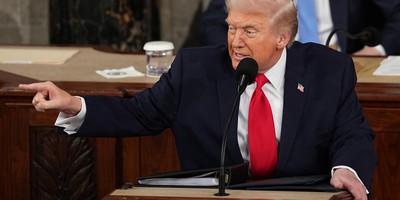But its chief purpose is to propose a laundry list of new taxes to pay for Obama's costly vision of a far bigger government than we have now, and to give him and the Democrats political cover while they continue to spend our money like there's no tomorrow.
If Obama were truly concerned about the deficits the feds have racked up, he wouldn't have produced a budget that last year left behind a deficit of $1.4 trillion, a post-World War II spending record. Indeed, his budgets are projecting trillion-dollar deficits for most of this decade to come.

He could have called for a commission as soon as he was inaugurated to deal with the mounting federal debt, whose size is expected to be about 90 percent of the U.S. economy by 2020.
But Obama had a lot of big spending bills to enact first. A nearly $900 billion "stimulus" bill to create jobs that, judging by the stubborn 10 percent jobless rate, has proven to be a failure. A government-run healthcare plan that is purported to cost $1 trillion, but that we all suspect will cost taxpayers trillions of dollars more.
Throw in hundreds of billions more for his energy bill, his plans for an army of financial regulators, including a bottomless bank-bailout fund, and his continuing expansion of the social-welfare bureaucracy, and now we're talking real money.
Recommended
He knows all of this additional government doesn't come cheap, and he will need more money to pay for it all, so one of the commission's primary jobs is to come up with ways to extract more taxes from the U.S. economy and middle-class American workers.
Last week, just as the 18-member commission was about to hold its first meeting, Obama told reporters that "everything has to be on the table," a statement that the Washington Post said "raises the possibility that he could ... backtrack on his pledge not to raise taxes for the middle class."
The president and other senior administration officials "have left the door open to tax increases, even for those earning less than $250,000 a year," the Post reported last week.
To make sure that the commission lays the groundwork for higher taxes to pay for Obama's record spending levels, the White House has stacked the panel with people who have a record of supporting tax increases and more government spending.
The commission's two co-chairmen are former Clinton White House chief of staff Erskine Bowles, an unabashed liberal who cheered President Clinton's tax increases that pushed the effective top tax rates to more than 40 percent, and former Republican Sen. Alan Simpson of Wyoming who voted against President Reagan's 1986 tax cuts and supported George H.W. Bush's tax hike that pushed Reagan's top 28 percent rate to 31 percent and raised payroll taxes on the middle class.
The commission's executive director is former Clinton White House domestic adviser Bruce Reed, on leave as president of the Democratic Leadership Council, who is hostile to across-the-board tax rate cuts and a loyal Obama partisan.
Backing them up is a gang of Democratic tax-and-spend liberals who are the least likely to come up with a full-blown plan to slow the growth in government and reduce spending. All are major supporters of Obama's big spending plans and supporters of his plans to raise taxes.
They include Illinois Sen. Dick Durbin; the arch-liberal Democratic whip, Sen. Kent Conrad of North Dakota; Alice Rivlin of the liberal Brookings Institution; and union leader Andy Stern, former president of the far-left Service Employees International Union, who has been a close Obama adviser.
House Democrats include Reps. John Spratt of South Carolina, Xavier Becerra of California and Jan Schakowsky of Illinois. A few of Obama's rich Democratic donors round out the list.
The six Republican members are conservative tax-cutters with a known reputation as deficit hawks, including Sen. Tom Coburn of Oklahoma, whom the Democrats call "Dr. No," and Wisconsin Rep. Paul Ryan, a Jack Kemp-type growth Republican who is pushing market-oriented ideas to shrink the unsustainable costs of Social Security and Medicare entitlements.
Obama and his friends on the commission want people to think that the chief problem with mounting deficits is not enough tax revenue, when too much spending is the cause.
In fact, "by 2020, more than 95 percent of the expanded budget deficit will result from higher-than-average spending, and less than 5 percent will be from lower-than-average revenues," the Heritage Foundation's chief budget analyst Brian Riedl told me.
Americans instinctively understand this, which is why the Democrats' irresponsible spending binge will be a paramount political issue in the midterm elections to come. The bumper sticker of the year will be "Throw the spenders out."

























Join the conversation as a VIP Member